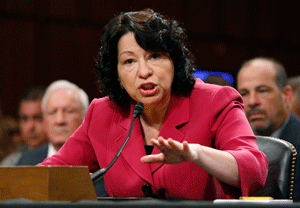Judge Sonia Sotomayor took on detailed questions about court cases both famous and arcane as the Senate Judiciary Committee opened what was expected to be a quick process to confirm the 55-year-old appeals court judge to a seat on the U.S. Supreme Court. After the first day of hearings opening statements by the 19 members of the Judiciary Committee, senators began a first round of questioning on July 14, each taking a half-hour for one-on-one discussion with Sotomayor about her judicial philosophy on a range of subjects. Questions aimed at getting at how Sotomayor would rule on particular types of cases proved as unsuccessful in eliciting a specific answer as they have at previous nominees' Supreme Court confirmation hearings.
Amid questions about Sotomayor's rulings as a member of the 2nd U.S. Circuit Court of Appeals, she was asked to discuss Supreme Court opinions on the detention of Japanese-Americans during World War II, on a recent ruling overturning a District of Columbia ban on handguns and on references in her public speeches about personal experiences influencing a judge's rulings. She was also extensively questioned about the constitutionality of abortion.
In questioning her July 14, Sen. Herb Kohl, D-Wis., asked Sotomayor whether she thought that Roe was "settled law." She answered by saying only that the 1992 case Planned Parenthood v. Casey reaffirmed the central holdings of Roe, which continues to be the precedent.
Sen. Tom Coburn, R-Okla., questioned her about the legality of a woman terminating a pregnancy at 38 weeks if it were discovered the unborn child had spina bifida, a congenital defect often resulting in paralysis. Sotomayor said that she could not answer that question because the hypothetical situation was too abstract. "I would have to look at what the state of the state's law was on that question," she explained. Even if she had that kind of information, she said, she could not answer because such a case might come to the court. Coburn asked Sotomayor whether advances in medical technology should have any effect on the legality of abortion as determined by Roe v. Wade, the 1973 ruling legalizing it nationwide. He cited as an example medical technology that allows premature babies born at 21 weeks to grow into healthy children. "All I am asking is should viability be considered as we discuss these delicate issues?" he said. Sotomayor said she could not answer Coburn's question because the issue in the Roe decision was the constitutional right of a private citizen, not the viability of a fetus. "I can't because that is not a question the court reaches out to answer," she said.
Anti-abortion protesters interrupted the proceedings several times during the first two days, shouting slogans about abortion from their seats in the public sections of the Senate hearing room before security guards removed them. Among the protesters who were removed and arrested was Norma McCorvey, who was known as plaintiff Roe in Roe v. Wade. After a change of heart about the legality of abortion, McCorvey has become a regular participant in pro-life protests in Washington and elsewhere.
A few glimmers of personal information about Sotomayor did come out in the first day she was answering senators' questions, such as when she was asked whether her views on civil rights had changed after the 9/11 terrorist attacks and how the events personally affected her. After the attack on the World Trade Center, she said her neighborhood in New York's Greenwich Village was cut off for car traffic for some time, as emergency services used the streets for staging purposes. But that did not change her perspectives on the Constitution, she said, describing it as a timeless document that can address changing circumstances. She also talked about how, although she is a native of New York who continues to live in the city, she travels around the country and likes to stay in people's homes so she can get a better idea of how others live. "I try very, very hard to ensure that in my life I introduce as much experience as I can with other people's lives," she said.
In her opening statement July 13, Sotomayor introduced her mother, stepfather, brother, sister-in-law and their children. She referred to her extended family, godchildren and friends who also were in the room. She summarized her own life story, growing up in the Bronx borough of New York, the daughter of a factory worker with a third-grade education who moved to the U.S. from Puerto Rico during World War II. After her father died when she was 9, she explained that her mother sat beside her and her brother at the kitchen table, studying for a nursing degree to better care for her children. Sotomayor, a Catholic, graduated from Cardinal Spellman High School in the Bronx and went on earn scholarships to Princeton University and Yale Law School.
Committee chairman Sen. Patrick Leahy, D-Vt., told reporters July 13 he expected the hearing to wrap up within the week, leaving plenty of time for the committee to vote on Sotomayor's nomination and move it on to the full Senate before Congress adjourns for its August break. Sotomayor was nominated by President Barack Obama May 26 to replace Justice David Souter. The court's 2009 term opens in October but the justices will rehear a case on the Campaign Finance Reform Act of 2002 several weeks earlier, on Sept. 9.








